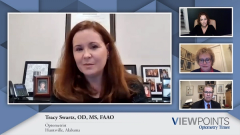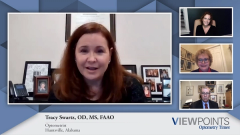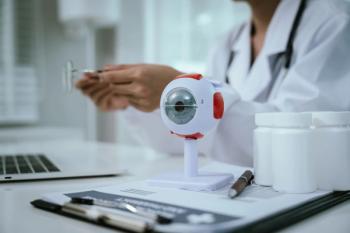
Counseling and formulary concerns for DED therapies
Episodes in this series

Marguerite McDonald, MD: Do you use technicians in patient counseling?
Crystal Brimer, OD, FAAO: I do. I used to do it myself more, but the better that my technicians and my assistants have gotten, the easier it’s been for me to let go of that and know that they’re going to do an amazing job. The way that I got them to that point was doing it myself but having them continually listen and hear it from me over and over, and I had a lot of tools. I’ve got the Dry Eye Institute, so I’ve got 400 pages worth of resources. In my office, they have written out scripts of what every product does and what to say about it. In the examination room, when I’m face to face, I may be able to explain to a patient why they use this omega-3 instead of something over the counter, but I need them [staff members] to explain it exactly the same way, so that message is carried through over and over. That’s helped my staff get better at it, more confident, more comfortable, which has then made me more comfortable turning it over to them. So I can advise them about what I want them to do, and then leave the room and let them take over.
Marguerite McDonald, MD: Do you find that the cost of medication or maybe formulary issues are affecting your patients’ ability to get the medicines you prescribe?
Crystal Brimer, OD, FAAO: Yes, and I commiserate with them, but we work so hard. Here are some tips that I can share with you. No. 1, prior authorizations [PAs], we do them over the phone and we get a much better success rate. No. 2, when I have them fill out my dry eye questionnaire before they ever come for their evaluation, I ask them to write everything, everything, they have ever tried in their 20 years of misery, and then circle it if they’re still using it. I do extensive testing with my Keratograph 5M and other things during the evaluation. We take these little chunks of information, and that’s what we give on the PA. When it talks about what they’ve used in the past, we basically...we write everything they’ve ever tried, here’s all the negative testing, all the data we collected, and it was not adequate... and here’s why this patient needs this. That has helped us tremendously, especially when we do it over the phone.
Marguerite McDonald, MD: Great.
Crystal Brimer, OD, FAAO: I’ll say one more thing. There are also pharmacies you can work with, where if you have a few different drugs on the market and that insurance company wants you to use No. 1 first, but you want No. 3 to be given, you tell the pharmacy what your tier choice is and they can help you do that 30-day trial. They correspond with the patient, communicate with them, “is it working, are you having adverse effects,” and go ahead and change it to my preferred prescription. We’re just now trialing that and so far, it’s working really well.
Newsletter
Want more insights like this? Subscribe to Optometry Times and get clinical pearls and practice tips delivered straight to your inbox.














































